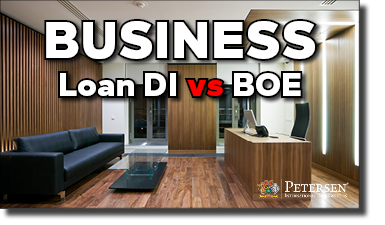Disability Loan Insurance vs. Overhead Insurance

Capital lending and finance make the world go round. Whether it be personal real estate, automobiles or business expenses, most Americans finance their entire way of life by accepting money from professional lenders with the promise of repayment including interest. Public and private companies regularly utilize business loans to start, run and enhance themselves. Business loans are commonly used for franchise start-ups, lines of credit, working capital, small business start-ups, mergers and acquisitions, construction financing, real estate purchases and equipment financing.
When a bank or other institution lends money to a business, the lender typically requires collateralized life insurance, but we are seeing emerging trends of the borrower making further demands of loan recipients to provide proof of disability insurance equaling the amount of the loan repayments. This provides comfort to the lender that should the borrower ever become sick or injured and unable to work, the loan repayment will proceed on time. The preferred method of addressing the lender’s insurance requirement is the prescription of comprehensive, “own-occupation” disability insurance that provides repayment of the monthly loan schedule and/or a lump sum payoff of the remaining loan balance.
This can be achieved in several ways, but not all solutions are created equal.
A common solution used by unwitting consumers is the appropriation of personal disability benefits for assignment to the lender. Many clients use their own personal income protection policies to satisfy business loan requirements. This is a great folly of the DI insurance world. A business owner should never assign personal benefits to satisfy a loan agreement while all the while putting his or her own family’s financial protection in jeopardy. Advise your clients to leave their personal DI coverage alone.
A more common avenue taken by insurance advisors is the prescription of Business Overhead Expense (BOE) insurance to indemnify business loan agreements. However, this too creates great real-world problems. BOE policies have a maximum benefit period of only 12 to 24 months which is usually insufficient to most business loans which commonly have durations of ten years or longer. More importantly, BOE plans only cover the interest on business loans, leaving principal payments completely uninsured.
The third and most proper option for borrowers is the purchase of a separate, loan-specific indemnification disability plan that protects independently from a client’s personal disability or BOE policies. Petersen International offers the Loan Indemnification Disability plan which is designed to satisfy a lender’s insurance requirements so that there is 100% complete financial protection of both the principal and interest, allowing the loan to close without any unnecessary delays.
The product provides customized declining benefit structures to meet the repayment schedules and stipulations of any loan agreement whether it be monthly benefits, lump sum benefits or a combination of the two. Petersen’s loan DI policy allows for complete financial indemnification of a client’s loan in case of unforeseen disablement, leaving their other important personal and business disability coverage intact.